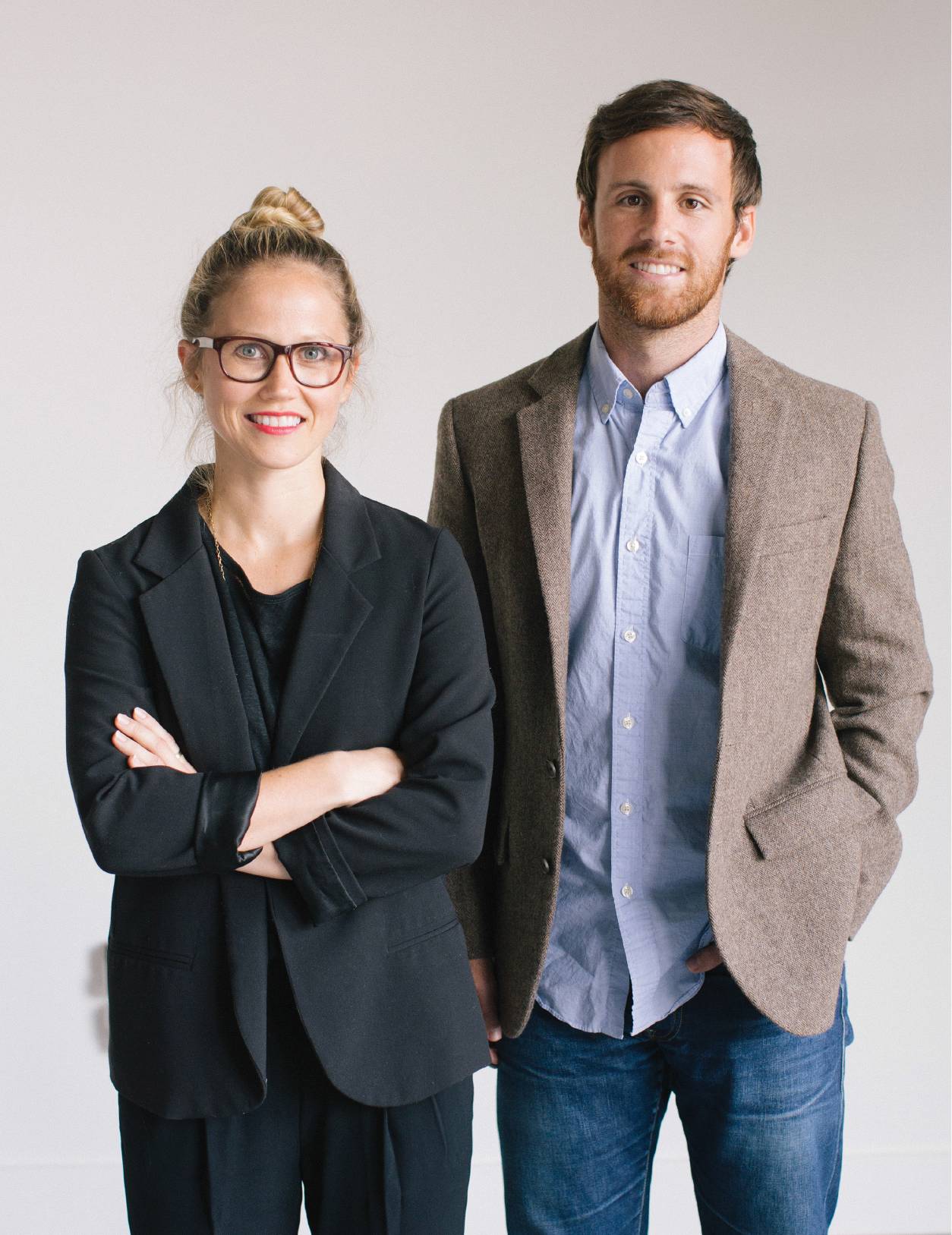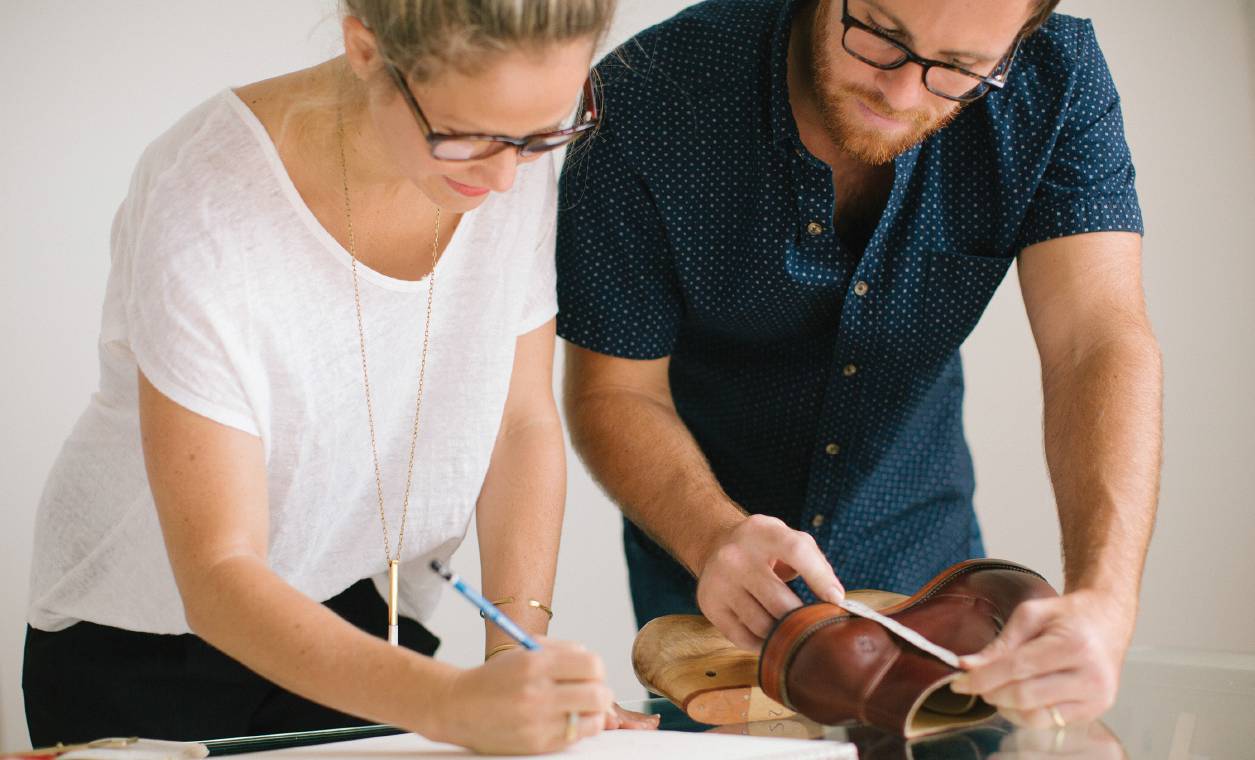
Nisolo co-founders Zoe Cleary and Patrick Woodyard
AT A GLANCE
Founded: 2011
Location: Nashville, TN
Team Members: 20 in the US, 60 in Peru, and 10 in Kenya
Founders: Patrick Woodyard (29) and Zoe Cleary (31)
Structure: For-profit
Traction:
• Experienced consistent, 100+% year-over-year growth since inception
• Supports the livelihoods of more than 300 individuals in the US, Peru, and Kenya
• On average, employees throughout its supply chain have received a 161% increase in income since beginning to work with the brand, and receive a full range of benefits including paid time off, healthcare, access to the Nisolo savings & loans program, and weekly educational classes covering health, nutrition, English, and financial literacy
Recognition:
• Forbes 30 under 30 Social Entrepreneur 2016 awarded to co-founder Patrick Woodyard
• Global Innovation Summit Ecosystem Award 2015
• SOCAP 2012 and 2014 Featured Social Entrepreneur awarded to co-founder Patrick Woodyard
• NEXT Awards Top Social Enterprise & Sustainability Startup 2014
• Unreasonable Institute and Agora Partnerships fellows 2013
• Awarded a 2013 Siegel+Gale fellowship for their “unstoppable commitment to solving the world’s most complex social issues”
In 2011, Patrick Woodyard took a development job in Trujillo, Peru, and stumbled across an entire community of remarkably talented shoemakers who were hand-producing gorgeous products.
Despite the high quality of the shoes, the artisans had trouble accessing global markets. Additionally, the local market for the goods was essentially saturated, as the industry in northern Peru partially employed more than 100,000 people. Seeing the potential positive impact if he could simply connect the local shoemakers with a global market, Woodyard began envisioning a social enterprise that would revitalize the shoe industry in Trujillo and commit to improving the well-being of its producers. After he partnered with fashion industry expert Zoe Cleary, the pair founded one of the world’s first social impact fashion labels, Nisolo, in 2011; all before they each reached the age of 28. We spoke with Woodyard about his journey and lessons learned along the way.
It’s one thing to have a great idea; it’s another to take that idea and take action on it. What gave you the courage to dive into this and pursue it?
Patrick Woodyard: A solid mix of passionate and practical decision-making. I was passionate to help the group of shoemakers I had met, and for them alone it was worth giving it a shot. On the practical side, I traded a goal of going to business school to get my MBA to start Nisolo instead. I knew from the beginning that the worst-case scenario in starting Nisolo would be that it would fail within the first year. But I also knew that if that happened, I would have learned more practical business acumen in that one year than in two years pursuing an MBA.
What has been the largest challenge you have faced in scaling the business, and how are you working to address it?
PW: Usually when I’ve been asked this question, people expect an answer about balancing social impact with profitability or scale. However, we’ve created a team that is first and foremost here for the social impact we can create, and purposefully, we’ve baked our social impact into our business model. We don’t give a percentage of proceeds off the top or do a buy-one, give-one model; rather, the impact comes in the way our products are sourced, and is directed at producers themselves rather than solely altruistic consumers. This way, no matter how many products we develop and sell over time, our social impact will never be compromised.
Just like many quickly growing startups, two of the greatest challenges we face include getting the right people in the right seat on the bus — to steal from Jim Collins — and learning to say no to noise and distraction and yes to what really moves the needle externally and internally within the organization.
As cliché as it sounds, people are everything. The toughest hurdle I have faced thus far in Peru, Kenya, and on the US side of our business is getting the right people in the right seats on the bus (and the wrong people off the bus). This is an evolving process, but it is one that deserves the attention it requires. The ways we have addressed this strengthening our recruitment process, doing a ton of interpersonal assessments, and just being really honest and transparent with one another about what is working and what isn’t.

“One of the greatest lessons I’ve learned so far is how incredibly willing people are to help you out if you have an impact-focused business that they can get excited about.”
What do you do to continue developing who you are as leaders?
PW: One of our core values at Nisolo is “mejorarse siempre,” which is an abbreviated Spanish phrase that basically means to never stop doing what you can to improve. This is the type of mentality that is core to our DNA and must be core to the type of people that join our team. Our leadership team has a clear understanding and mutual sentiment that we are still in the first few baby steps of what we hope to accomplish. In order for us to transition into adolescence and on into adulthood as a brand, we have to continually remain humble and do all that we can — from staying up-to-date with the best business books and articles to seeking mentors to maintaining a strong work/life balance — to develop our leadership skills.
What is the top lesson or lessons that you have learned so far in running Nisolo?
PW: What Jim Collins has to say about the flywheel is 100 percent correct. If you expect to arrive to that overnight success moment where you wake up and momentum is just taking off, you can go ahead and give up. The companies that that happens to are few and far between. You really have to maintain a 10,000-mile-march attitude and treat every day and every challenge as another push on the ole flywheel.
Also, one of the greatest lessons I’ve learned so far is how incredibly willing people are to help you out if you have an impact-focused business that they can get excited about. The first thing I did in the ideation stage was create an extensive exec summary and send it out to around 100 peers, former professors, mentors, and friends and family to ask for advice. This helped shape the initial plan a fair amount, and from there the following three years has been an insane rush and hustle. I’ve stayed hyper-focused on four things: learning from customers, selling as many shoes as possible to stay afloat, strengthening the efficiency and social impact of our supply chain, and surrounding myself with a team of incredibly talented, passionate, and humble individuals who are gung ho on taking Nisolo to the moon and having the greatest social impact possible along the way.
What is giving you hope for the future?
PW: Quite obviously, the social impact that we are creating gets me up and out of bed each morning. That being said, I am also deeply inspired when I am around people who are passionate about what they are doing and are willing to give a task, a project, or even a dream their all. The two places I regularly encounter this inspiration is from my team members at Nisolo as well as peers in our industry. I enjoy watching my team members work. And I enjoy keeping up with what is going on with the companies of friends within the social enterprise and fashion spaces, because nothing is more inspiring than seeing other entrepreneurs who face many of the same struggles and who identify with your lifestyle find success in one way or another.
“The social impact that we are creating gets me up and out of bed each morning.”
Woodyard’s Top 3 Pieces of Advice for Mission-driven Entrepreneurs
1 PRIORITIZE THE PRODUCT
Anyone starting a socially transparent brand must deliver in a profound way on product offering. The greatest way a brand can impact the ethical fashion space is to prioritize the product just as much as social impact. The space needs success stories, and it needs products that continually demonstrate to consumers that quality goods can be bought at affordable prices and produced and consumed responsibly as well.
2 FIND THE RIGHT PEOPLE
People are everything. Build a team and it will come.
3 TAKE ACTION AND BUCKLE UP
Nike might say “Just do it,” but Nisolo would say “Sure, do it, but buckle up, because it’s going to be a wild ride!”




